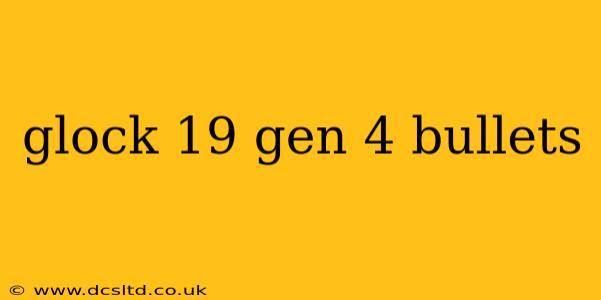The Glock 19 Gen 4 is a hugely popular handgun, known for its reliability and versatility. But understanding the ammunition you use is just as crucial as understanding the firearm itself. This guide delves into the world of Glock 19 Gen 4 bullets, covering everything from caliber to grain weight and beyond.
What Caliber Does a Glock 19 Gen 4 Use?
The Glock 19 Gen 4 is chambered in 9x19mm Parabellum, often shortened to 9mm Luger or simply 9mm. This is a very common and widely available cartridge, making finding ammunition relatively easy. However, it's important to remember that while 9mm is widely available, not all 9mm ammunition is created equal.
What Grain Weight Bullets Should I Use in My Glock 19 Gen 4?
The "grain weight" refers to the weight of the projectile (the bullet) in grains. There's a wide range of grain weights available for 9mm, typically falling between 115 and 147 grains. Heavier bullets generally have lower velocities but higher stopping power, while lighter bullets are faster but may have less stopping power. The best grain weight for you depends on your intended use.
- 115 Grain: These are popular for their high velocity and lighter recoil, making them good for practice and target shooting.
- 124 Grain: A good all-around choice offering a balance between velocity and stopping power. Often preferred for self-defense.
- 147 Grain: These heavier bullets are known for their reduced recoil and increased accuracy, making them suitable for competitive shooting or situations where precise shot placement is crucial.
It's crucial to consult your owner's manual for the manufacturer's recommended ammunition specifications for your Glock 19 Gen 4. Using ammunition outside of these recommendations could damage your firearm.
What Type of 9mm Ammo is Best for Self-Defense?
Choosing ammunition for self-defense requires careful consideration. While personal preferences play a role, certain characteristics are generally considered beneficial:
- Expanding Bullets (JHP): Hollow-point or jacketed hollow-point (JHP) bullets are designed to expand upon impact, increasing their stopping power and reducing over-penetration. This is a crucial factor in self-defense situations where you want to neutralize a threat without endangering bystanders.
- Reliable Function: Choose ammunition that has a proven track record of reliable function in your specific firearm. Test different brands and types at the range to identify what works best for you.
Always practice safe gun handling and consult with a qualified firearms instructor before choosing self-defense ammunition.
Are there different types of 9mm bullets?
Yes, there are many different types of 9mm bullets, categorized by their design and function. Besides the JHP mentioned above, other types include:
- Full Metal Jacket (FMJ): These bullets have a full metal casing, making them less likely to expand upon impact. They are typically used for target practice due to their lower cost.
- Lead Round Nose (LRN): These bullets are usually less expensive than jacketed options, but their use is generally restricted to practice at the range.
What is the difference between 9mm and .40 S&W ammunition?
The .40 S&W is a larger caliber cartridge than 9mm, meaning it uses a larger diameter bullet. This generally results in more stopping power but with increased recoil. The Glock 19 Gen 4 is not chambered in .40 S&W. Attempting to fire .40 S&W ammunition in a 9mm Glock 19 Gen 4 could result in serious damage to the firearm and injury to the shooter.
This information is for educational purposes only. Always practice safe gun handling and consult with a qualified firearms instructor before handling or using firearms. Ammunition selection should be based on individual needs and circumstances, with careful consideration of factors like intended use, firearm compatibility, and local regulations. Remember to always consult your owner's manual for specific recommendations from the manufacturer.
